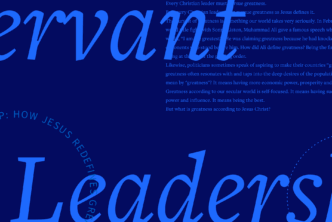By Duane Garrett
Speaking up for biblical principles is a dangerous thing. People may abuse you or accuse you, saying that you are a fool or even that you are evil. But Proverbs 9:7–8 gives us wise counsel in the face of such hostility:
Whoever corrects a scoffer gets himself abuse, and he who reproves a wicked man incurs injury. Do not reprove a scoffer, or he will hate you; reprove a wise man, and he will love you.
The fool
The “scoffer” in Proverbs 9:7–8 is a step beyond the “fool.” The fool in Proverbs is not a gullible, easily swindled person, as in “a fool and his money are soon parted.” Rather, “folly” describes actions or words that go against the rules that God established when he made the world. Folly can be immoral, undisciplined behavior (Ps 38:5; 69:5; Prov 5:23; 24:9), and it often shows itself in anger (Prov 14:17, 29).
Fools are quick to speak, supposing themselves to be wiser than they really are (12:23; 13:16). They are a danger to those around them (17:12). In short, a fool is a person who does not know right from wrong, is quick to anger, and is arrogant about his or her opinions. Sound familiar?
The ‘scoffer’ of Proverbs 9:7–8
The “scoffer” of Proverbs 9:7–8 is worse than the fool. Psalm 22:7–8 describes the behavior of these “scoffers.” They use crude humor: “All who see me mock me; they make mouths at me; they wag their heads.” They also deride faith in God, saying: “He trusts in the Lord; let him deliver him; let him rescue him, for he delights in him.”
The scoffer vehemently opposes moral behavior and genuine interpersonal decency. Using sarcasm, cruel humor, and a twisted wit, the scoffer belittles piety and distorts morality, so that what is good is despised while what is perverse is honored. Although there is obvious overlap between those who are fools and those who are scoffers, we can neatly distinguish the two like this: Fools practice folly, but scoffers are evangelists for folly.
We live in the age of the scoffer. Biblical notions of sexual morality are despised on social networks, in academia, in corporate life, and in mass media. Talk show hosts are masters of scoffing, and their disciples in the online mob react with extreme hatred to anyone who is out of step with their notions. With bitter mockery and vile abuse, they seek to destroy the lives of all who fall under their thought-police radar.
The prognosis of Proverbs 9:7–8 is bleak! If you try to correct such people, you will be met with hatred and even violence. They have fanatical devotion to their ways and are incapable of genuine self-examination and self-reproach, and therefore, they are impervious to rebuke or correction. Of all the categories of evil persons described in the Bible, the scoffer is the most inexorably wicked.
But this passage can also give us great comfort.
Scoffers today and yesterday
For me, it is a relief to read Proverbs and discover that there is nothing uniquely perverse about our times. Profane mockery and unrestrained hatred for God’s ways existed long before social media, even if modern communication has increased the volume. Scoffers existed in the time of Solomon, and scoffers stood around the cross of Jesus. By openly describing such people, Proverbs encourages me, just as it encouraged Israelites thousands of years ago. When I see the bitter humor of the scoffer, I may mourn, but I do not despair. After all, there is nothing new here.
The next time you are in equal parts depressed and outraged by scoffers and their mockery, remember Proverbs 9:7–8. Also, remember another piece of ancient wisdom, Ecclesiastes 7:10: “Say not, ‘Why were the former days better than these?’ For it is not from wisdom that you ask this.”
***
This excerpt exploring Proverbs 9:7–8 was adapted from Duane Garrett’s article “Handling Online Scoffers” in the July/August 2021 edition of Bible Study Magazine, available from Lexham Press.
Related articles
- Do Proverbs 26:4 and 26:5 Contradict? On the Contrary . . .
- Why Obedience to Jesus Trumps All: Thoughts on the Sermon on the Mount
- Who Wrote the Book of Proverbs? Why It’s Debated






